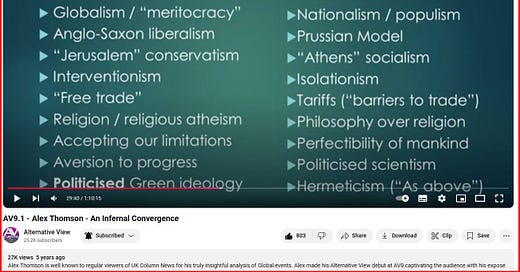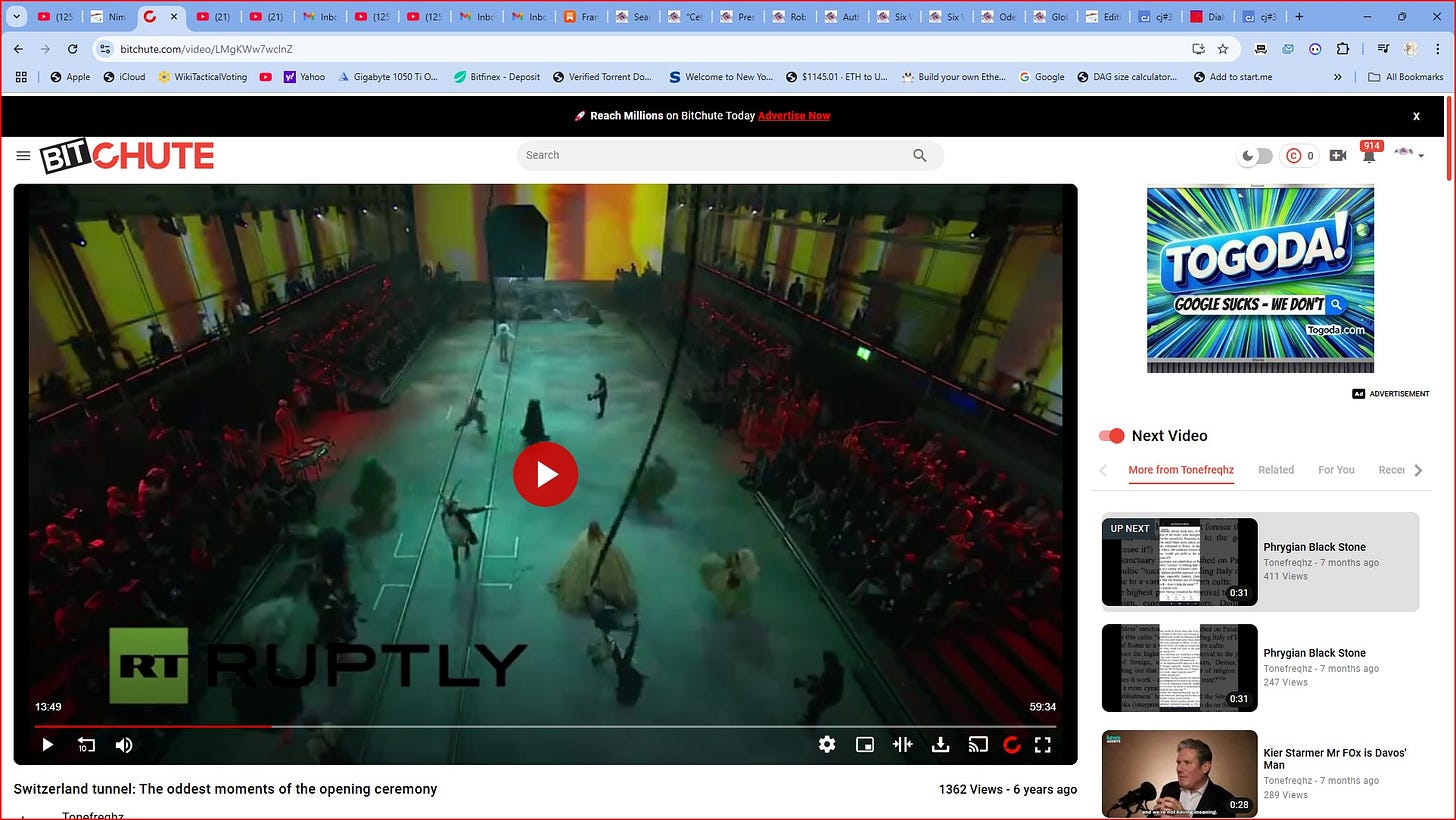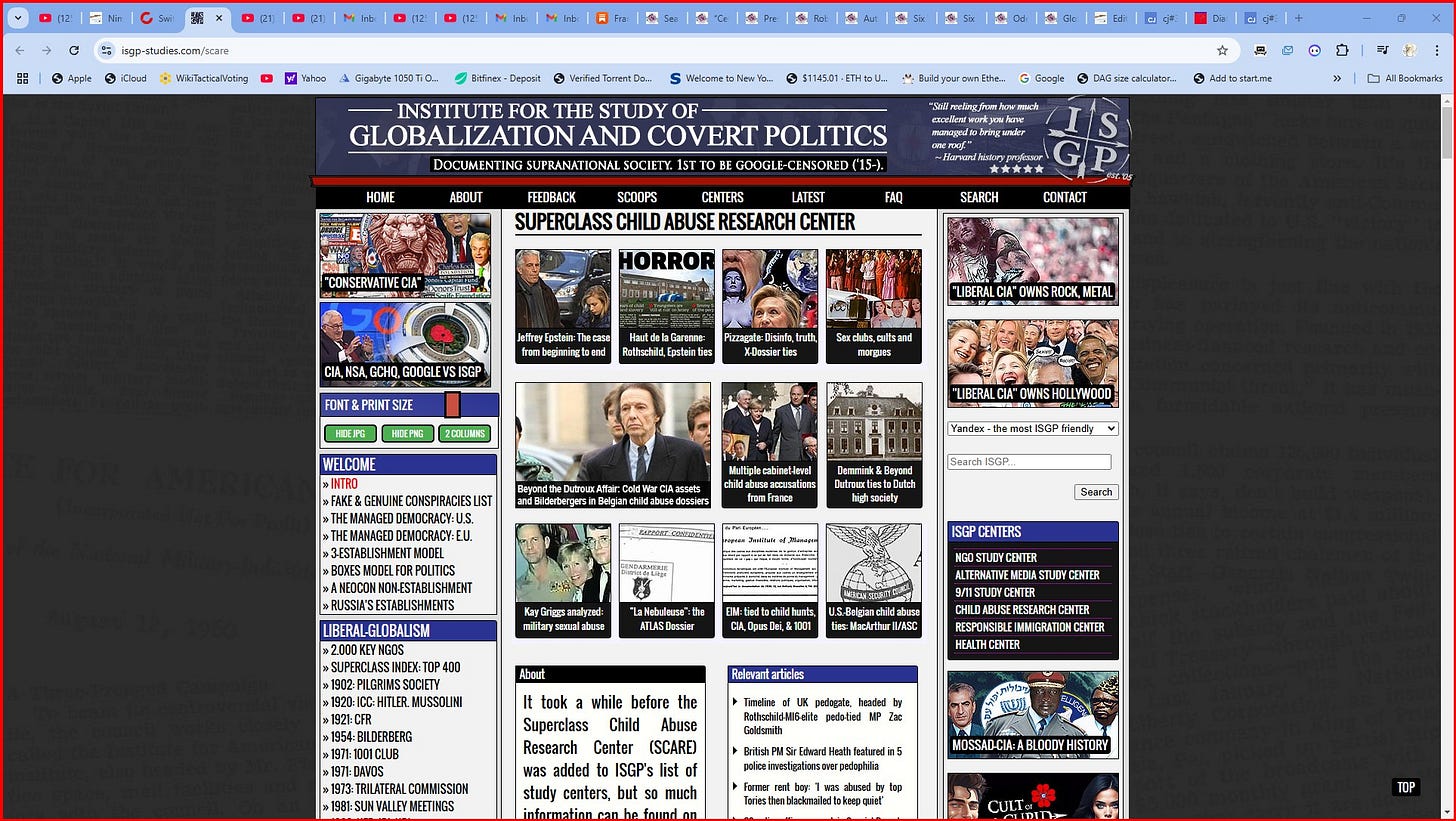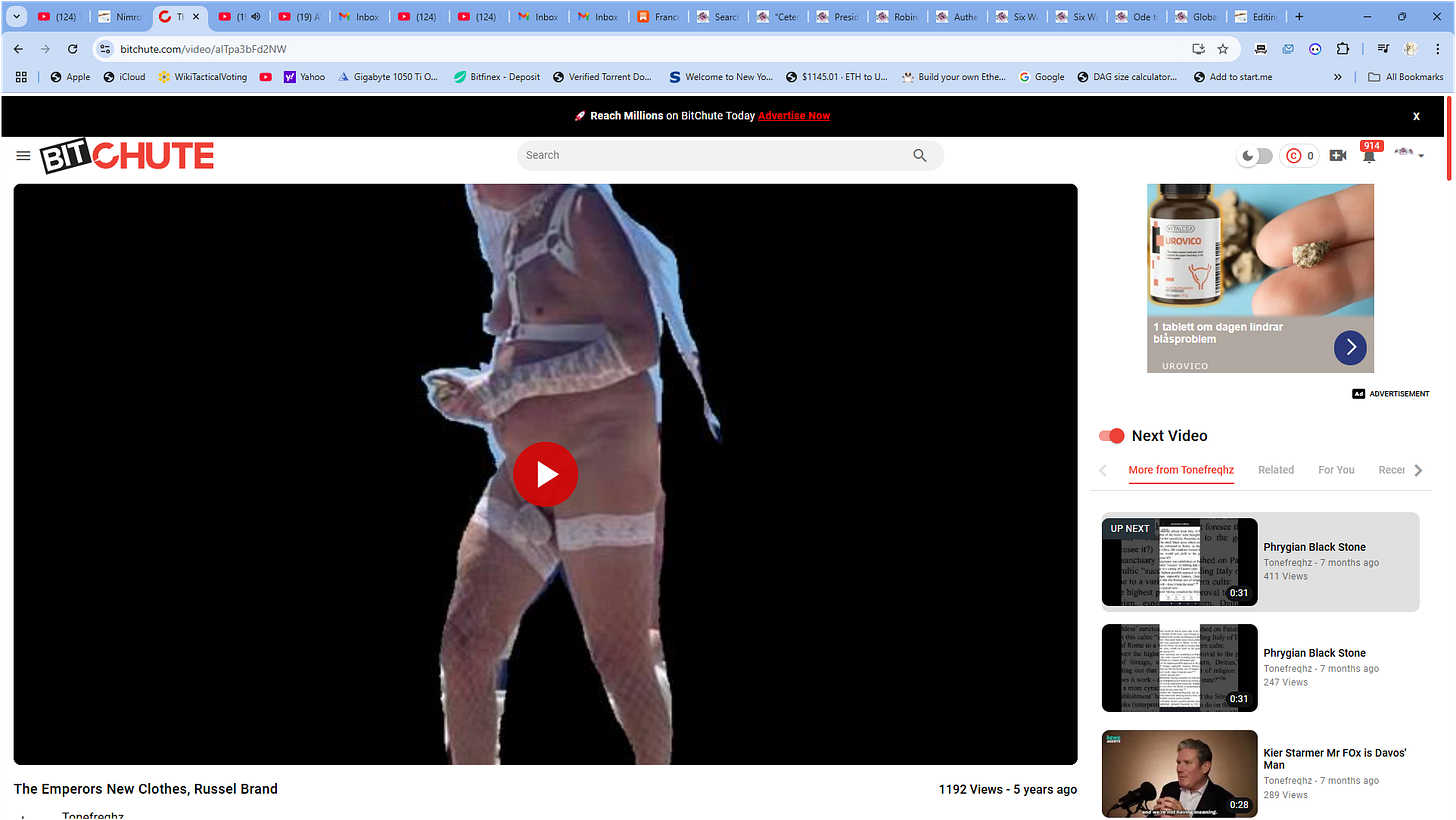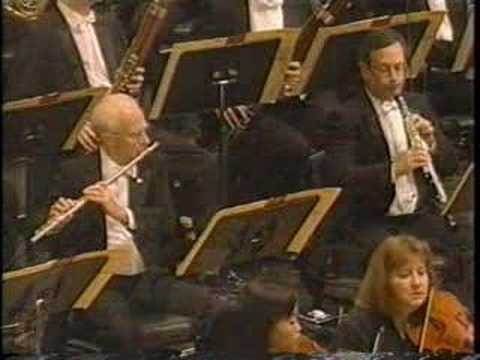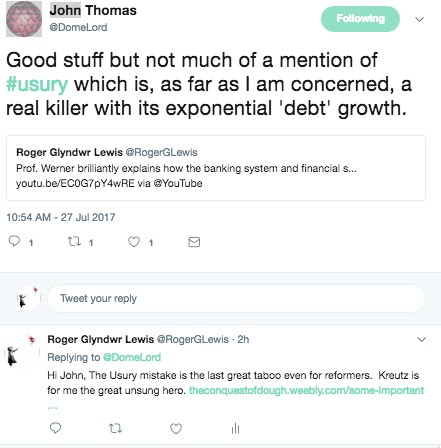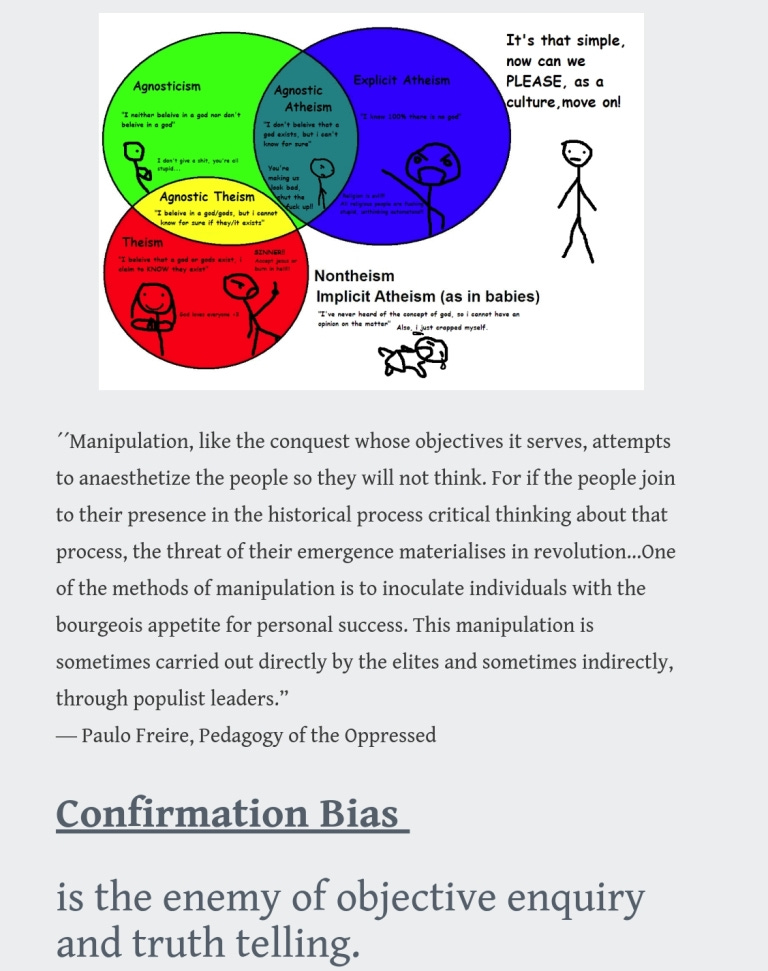“Ceterum censeo Carthaginem esse delendam”, nihil sub sole novum.
Rockerfellers v Rothschilds Aristotelians v Platonists Left V Right . In the Heuristics of Going DIrect its UP and Down and RIch and Poor not Left and Right.
AV9 - Alex Thomson - INVENTORS of EVIL THINGS ...
Alex Thomson discusses the manipulation of historical narratives, the promotion of evil through societal systems, and the use of symbols and bloodlines in power structures, connecting ancient practices to modern geopolitics and technology.
Detailed Summary for [AV9 - Alex Thomson - INVENTORS of EVIL THINGS ...](
by [Monica](https://monica.im)
[00:07](
In this segment, Alex Thomson is introduced as a significant contributor to alternative news, particularly focusing on the issues in the Middle East. He emphasizes the importance of independent media and the misconceptions surrounding viewer engagement metrics.
- Introduction of Alex Thomson and his contributions.}
- Discussion on the misleading nature of YouTube view counts and their impact on perceived interest.}
- Recognition of UK Column as a vital source of alternative news and analysis.}
- Introduction to the theme 'Inventors of Evil Things', addressing the manipulation of various life domains by self-serving groups.}
[08:53](
The video discusses the concept of 'evil' through various lenses, including historical, psychological, and sociological perspectives, as well as the role of international organizations in regulating behaviors related to maritime trade and beyond.
- Introduction to international diplomatic bodies, focusing on the International Maritime Organization (IMO) and its historical significance.}
- Exploration of the formal study of evil, including its definition and the mechanisms that lead individuals to commit evil acts.}
- Discussion on the scientific disciplines—genetics, linguistics, and archaeology—that contribute to understanding the history of early humanity and the concept of evil.}
[17:47](
This section discusses the historical alignment of ancient civilizations with celestial constellations and the societal shifts that occurred during the farming revolution, emphasizing the transition from hunter-gatherer lifestyles to settled communities.
- Exploration of ancient alignments with constellations, particularly referencing sites like Teotihuacan and the pyramids in Egypt.}
- Discussion on the power dynamics of ancient societies, suggesting that they marked their dominance over the earth through monumental constructions.}
- Introduction of the farming revolution and the implications it had on the lifestyles and societal structures of early human communities.}
- Examination of the emergence of symbols and social hierarchies, marking a shift from tribal bands to more complex societal organizations.}
[26:41](
The video discusses the historical and geographical clusters of satanic ritual abuse in the UK, particularly focusing on areas in Scotland and their connections to royal bloodlines and the legacy of the Roman Empire.
- Introduction to the concept of bloodlines and their historical significance, particularly after disasters.}
- Exploration of geographical clusters in Scotland, highlighting areas with a history of satanic ritual abuse and missing persons.}
- Discussion on the generational nature of these abuses and the role of local populations in these areas.}
- Connection between historical tribes, the Roman Empire, and the modern implications of these bloodlines and their influence across Europe.}
From the World Cup to the Olympics, it is not a significant event if you don't have an unusual opening ceremony to go with it. This was also the case when the Gotthard base tunnel, the longest and deepest in the world, was inaugurated on Wednesday. Here are some of the most striking moments from the ceremony - we have tried to explain what is going on as far as possible. It was not always possible. Warning: This article contains partial nudity https://www.bbc.com/news/in-pictures-36428799 Full Satanic ritual for the opening of the Gotthard Base Tunnel in Switzerland. It was attended by heads of finance, state, and all levels of society. Yes, it is creepy and evil, but yes, it is still important. Video pulled from RT (Russia Today), a phenomenal news source. Enjoy!
https://isgp-studies.com/scare
[35:36](
The video discusses the controversial views of George Bernard Shaw and explores themes of societal value, population control, and the implications of certain ideologies on humanity.
- Introduction of George Bernard Shaw, highlighting his controversial stance and influence during the interwar period.}
- Shaw's radical ideas, including the abolition of the English language and his views on societal structures.}
- Discussion on the left's support for Hitler, emphasizing the awareness of his violent intentions.}
- Critique of societal contributions, questioning the value of individuals who do not contribute meaningfully.}
- Shaw's call for a humane method of mass killing, reflecting on the darker aspects of 20th-century ideologies.}
[44:30](
The video discusses the historical context of oppression and exploitation in Europe, referencing philosophical perspectives and significant events that contributed to systemic violence and dehumanization.
- Memorials in Western Europe commemorate the Jewish victims and others who were deported, raising questions about their fate.}
- The speaker reflects on the harsh treatment of individuals, comparing modern exploitation to historical slavery, emphasizing the cycle of dehumanization.}
- Karl Marx and Friedrich Engels are referenced, highlighting their acknowledgment of the philosophical justifications for violence and mass extermination in Europe.}
- A brief historical overview is provided, indicating the rise of systemic oppression in Europe during the 12th century, linked to the Crusades and trade control.}
[53:25](
The video discusses the historical influence of powerful cartels and secret societies in shaping geopolitical events, particularly in the context of post-World War I Germany and their connections to illicit activities.
- Introduction of the concept of imposters who gained power through unethical means, including drug trafficking.}
- Discussion on the impact of World War I on geopolitics and the need for Germany to be rearmed in the interwar period.}
- Mention of a crooked family involved in arms production and their connections to secret societies like the Rosicrucians.}
- Exploration of how Germany's reputation suffered post-war and the strategic maneuvers involving the Krupp steel factory.}
- Explanation of how the Netherlands served as a base for German operations through strategic business maneuvers.}
[01:02:20](
The video discusses the insights of Will Pawlik, who speaks about his experiences with passive radio frequency identification technology and its implications during the 1970s, particularly in relation to government operations and societal concerns.
- Introduction to the concept of global revolutionaries and their influence.}
- Will Pawlik's posthumous interview reveals his expertise in RFID technology and its introduction to key parties.}
- Pawlik reflects on his initial intentions behind the technology and the unexpected associations with religious beliefs regarding marking systems.}
- The meeting's secrecy and the eventual realization of the questionable integrity of some attendees.}
AV9.1 - Alex Thomson - An Infernal Convergence
Alex Thomson explores the competing philosophies of Aristotelianism and Platonism shaping global power dynamics, delving into Britain's elitist cabals, geopolitical strategies, and the manipulation of societal structures for control.
Detailed Summary for [AV9.1 - Alex Thomson - An Infernal Convergence](
by [Monica](https://monica.im)
[00:02](
Alex Thomson discusses the complex dynamics of elite groups in modern Britain, emphasizing their influence on the nation and the necessity for Britain to maintain a global presence.
- Introduction of Alex Thomson and his previous impactful presentations.}
- Thomson addresses the question of the religious affiliations of influential groups in Britain.}
- He describes the ongoing conflict between different elite factions in Britain, coining the term 'infernal convergence' to illustrate their detrimental influence.}
- Thomson references George Orwell's concept of 'Airstrip One' to discuss the implications of elite control over Britain.}
[08:45](
The video discusses the influence of geopolitical dynamics and the evolution of local governance in Britain, emphasizing the shift from democratic structures to more centralized, cabal-like authorities.
- The discussion begins with the geopolitical maneuvers of various nations, particularly focusing on the Chinese attempts to disrupt established systems.}
- The speaker delves into the historical context of British elites and their role in shaping governance models, highlighting the complexities of common law jurisdictions.}
- A critique of the loss of local democracy in Britain since World War II is presented, attributing this decline to actions taken by various Conservative governments.}
- The video explains the transition to unitary authorities and how this change has affected local governance, moving towards a more centralized decision-making process.}
- Finally, the speaker summarizes the core techniques used by elites to maintain control over governance structures at all levels, from local to global.}
[17:32](
The video discusses various techniques used by influential groups in society, focusing on the philosophical underpinnings of power dynamics and governance in Britain.
- Introduction to the techniques of control and influence in society.}
- Discussion of key methods used by powerful groups, including control over healthcare and education.}
- Analysis of the dominant cabal's philosophies and their Aristotelian roots.}
- Exploration of Aristotle's ideas on governance and the implications for modern political systems.}
- Identification of key elite families in Britain and their influence on society.}
[26:16](
The video discusses Aristotle's views on human nature, governance, and the dichotomy between Aristotelianism and modern liberalism, emphasizing the consequences of separating law and justice from societal order.
- Introduction to Aristotle's view on human nature and the role of government in maintaining order.}
- Exploration of the consequences of separating law and justice, leading to a discussion on the nature of humanity.}
- Comparison of Aristotelianism with globalist ideologies, highlighting the belief in meritocracy and the abolition of the nation-state.}
- Critique of interventionism and corporatism in modern governance, emphasizing its impact on society and individual rights.}
[35:04](
The video discusses the ideological shifts during the Nazi period, focusing on the rejection of traditional religious authority and the emergence of a new worldview among elites in Germany and Russia, which sought to establish a Eurasian superpower based on collaboration and resource exploitation.
- The video introduces the Nazi-era belief in heroic Aryan forefathers who sought to replace traditional divine authority with their own rule.}
- It highlights a popular idea among German and Russian elites to unite against the Anglo-Saxon model and form a powerful Eurasian alliance.}
- The discussion includes the philosophical underpinnings of this ideology, particularly Aristotelianism and its connection to mercantilism and interventionism.}
- The video references Carroll Quigley, emphasizing his views on the historical context of Aristotelianism and its influence on economic systems and power dynamics.}
[43:47](
The discussion revolves around the geopolitical strategies and historical influences of various nations, particularly focusing on the Aristotelian model of power dynamics and its impact on global relations.
- The concept of abolishing technology theft and its implications for nations like Israel, Russia, and China.}
- Exploration of geographical strongholds and historical trading cities that have influenced modern power structures.}
- The role of the Commonwealth and the push against the nation-state idea in favor of a globalist perspective.}
- Analysis of the Aristotelian model's influence on Eurasian dominance and its relationship with Islamic fundamentalism.}
- Examples of historical leaders who exemplified Aristotelian elitism and their actions against their own nations.}
[52:34](
The video discusses the geopolitical significance of Ukraine, exploring historical figures and their ideological motivations, particularly in relation to Nazi Germany and the concept of Aristotelian sea power. It also touches on the implications of nuclear technology as a means of control and population management.
- The importance of Ukraine as a strategic heartland in global power dynamics.}
- Martin Bormann's role and his apparent lack of genuine German interests during the war.}
- The collaboration of major world leaders in using nuclear technology as a tool for population control and maintaining power.}
- References to a book discussing Aristotelian principles in the context of modern geopolitical strategies.}
[01:01:22](
The discussion revolves around the complexities and dangers of modern warfare, particularly the potential for tactical nuclear conflicts and the philosophical implications of scientific advancements in military applications.
- The potential for battles at sea and tactical skirmishes is emphasized, highlighting the precarious nature of current military strategies.}
- The preservation of cities during conflicts is discussed, indicating a strategy that aims to maintain urban centers for future economic recovery.}
- A philosophical shift in science is noted, suggesting that scientists should serve military interests, reflecting a deeper integration of science and defense.}
- The motivations behind the desire for nuclear war are explored, including themes of economic collapse, depopulation, and the profit motives of those in power.}
- The concept of a mentally controlled populace is introduced, suggesting a strategy to maintain power through economic and psychological manipulation.}
SECRET CITY - A FILM ABOUT THE CITY OF LONDON, THE CORPORATION THAT RUNS IT.
https://www.bitchute.com/video/4WXeiHEoMmGd/
(August 2015) -Click here to support the follow up to Secret City
https://www.indiegogo.com/projects/mo...
http://secretcity-thefilm.com/
https://www.facebook.com/SecretCityFi...
https://twitter.com/SecretCityDoc
A film about the City of London, the Corporation that runs it, and its role in the economic crisis. By Michael Chanan and Lee Salter. See www.secretcity-thefilm.com
The film explores the historical, political, and financial power of the City of London Corporation, its secretive operations, and its impact on inequality and global economics.
Detailed Summary for [Secret City - A film about the City of London, the Corporation that runs it.](
by [Monica](https://monica.im)
[00:00](
The video explores the complexities of London's identity, focusing on the distinctions between the City of London and Greater London, as well as the political power held by the Corporation of London.
- An initial confusion about the location within London highlights the multifaceted nature of the city.}
- Discussion around the concept of power in London, emphasizing its geographical and institutional aspects.}
- Many people are aware of the City of London but lack understanding of the Corporation of London as its governing body.}
- The Corporation of London is identified as a crucial player in the power dynamics of both the UK and global contexts.}
[09:00](
This segment explores the historical development of London, focusing on its unique governance structure, the significance of Cheapside, and contemporary critiques of the City of London's priorities.
- The establishment of significant settlements around London, including Westminster and Southwark, marked an early attempt to extend the city's authority.}
- London's autonomy was recognized as part of its ancient constitution, positioning the city alongside the monarchy, parliament, and the church.}
- Cheapside served as the medieval heart of London, where merchants traded goods, reflecting the city's bustling economic activity.}
- Criticism arises regarding the City of London's current focus on financial interests, suggesting it has strayed from its historical roots.}
- The narrative includes perspectives from local representatives, highlighting the residential aspects of the City and its evolving identity.}
[18:05](
This section discusses the historical development and significance of London's libraries, particularly focusing on the strategic role they played since the 17th century.
- Middlesex's historical context and its connection to the current libraries in London.}
- The strategic organization of London libraries and their connections to the British Library.}
- The establishment of public libraries in London by the late 17th century and their cultural significance.}
- The autonomy of libraries in their operations and the various functions they developed over time.}
[26:52](
The video explores the historical development of London, highlighting the impact of significant figures like Nathan Rothschild and the evolution of the city's economy and infrastructure over time.
- Introduction to the rapid development of London and its historical maps.}
- Focus on Nathan Rothschild's rise to wealth during the Napoleonic Wars and the establishment of the Rothschild banking dynasty.}
- Discussion of the gold price fixing in London and its global significance, particularly the role of Rothschild's headquarters.}
- Examination of London's expansion and the introduction of train lines, marking the beginning of faster access to the city.}
- Analysis of London's varied economy, emphasizing the dominance of the financial sector and its impact on other industries.}
[35:50](
The video explores the growing inequality in London, highlighting the contrast between the wealth of the City and the struggles of its residents, particularly in relation to housing and economic opportunities.
- The concept of borders in London is compared to those between Mexico and the United States, indicating a divide between different socio-economic areas.}
- The increase in income levels within the City has led to rising prices, making it difficult for lower-income residents to afford living in London.}
- A personal story illustrates the challenges faced by young professionals in the city, who despite having good jobs, struggle to afford housing and feel disconnected from the broader economic issues.}
- The lack of awareness among residents regarding their voting rights and the political changes affecting them is emphasized, showcasing a disconnect between local governance and community engagement.}
[44:44](
The video delves into the secretive nature of the Corporation of London and the unique role of the Lord Mayor, highlighting the complexities of governance within this historical institution.
- Discussion of the dramatic and secretive questioning process by the Corporation of London, emphasizing the offensive nature of this secrecy.}
- Introduction to the Lord Mayor of London, who is described as a monarch over all except the king, and the historical significance of his role.}
- Explanation of the Mansion House and the unique election process of the Lord Mayor, which is conducted by obscure livery companies rather than the general public.}
- Description of the requirements to become a councillor in the City of London, including the necessity of being a freeman and the ceremonial process involved.}
- A reflection on the relationship between the medieval constitution of the city and its ancient guilds, showcasing the historical depth of London's governance.}
[53:46](
This section explores the financial structure and political significance of the City of London, emphasizing its unique status and the obscurity surrounding its assets and expenditures.
- Demonstrations in London often target the financial institutions in the City, considered the core of economic power.}
- The City of London manages three main financial accounts, including public funds and private assets, with significant charitable contributions.}
- The City has a longstanding history of financial stability, leading to a lack of transparency regarding its total assets.}
- A portion of the City's budget is allocated to lobbying efforts and maintaining public spaces, indicating its influence in both local and international spheres.}
[01:02:38](
The video discusses the significant decline in global stock markets and examines the underlying economic crisis attributed to the financial sector's influence and deregulation, particularly in London.
- Overview of the sharp declines in various global stock markets, indicating a widespread economic downturn.}
- Analysis of the economic crisis stemming from financial capital's exploitation and the accumulation of massive debts.}
- Historical context of financial deregulation beginning in the 1980s under Thatcher, which enabled speculative practices in the City of London.}
- Impact of the global financial network on local communities, particularly in Hackney, highlighting limited job opportunities for young people.}
- Discussion on the superficial prosperity generated by the financial services sector and the consumer culture it fosters.}
The documentary explores Britain's shift from a colonial empire to a global financial hub, highlighting the secretive operations of the City of London, offshore tax havens, and political complicity in fostering financial secrecy and inequality.
Detailed Summary for [The Spider's Web: Britain's Second Empire | The Secret World of Finance](
by [Monica](https://monica.im)
[00:18](
This video explores the transformation of Britain from a colonial empire to a modern financial powerhouse, detailing the historical significance of the British Empire and its impact on global finance.
- The British soldier is a global symbol of Britain's historical presence, spanning from Gibraltar to Hong Kong.}
- The British Empire, the largest in history, ruled for over 300 years, but faced decline as countries sought independence.}
- The film discusses Britain's shift from colonialism to finance as a response to the disintegration of its empire.}
- London was the center of global finance during the Empire, serving as the financial heart that supported imperial trade.}
- The decline of the Empire led to threats against British commercial interests, exemplified by the nationalization of the Suez Canal.}
[09:31](
The City of London operates as a unique financial district with its own governance and legal exemptions, setting it apart from the rest of London and the UK.
- Introduction to the City of London as a distinct financial district within the larger city.}
- Overview of the City of London Corporation, which functions like a local council but operates as a private entity.}
- Historical context of the City of London's unique legal status stemming from a deal made in 1067 with William the Conqueror.}
- The political system of the City of London is influenced by medieval traditions, with business interests dominating the electorate.}
- Discussion on the Corporation of London as a unique political phenomenon that has yet to attract significant academic study.}
[18:46](
The video discusses the complexities of offshore trusts and the significant amount of assets, estimated at $50 trillion, that are held in secrecy. It highlights the Cayman Islands' new agreement with the UK to combat tax evasion and the role of trusts in the British financial secrecy model.
- Introduction to the types of assets held in offshore trusts, including art, gold, and real estate.}
- The Cayman Islands sign a new agreement with Britain to tackle tax evasion, marking a significant step in financial transparency.}
- Explains the British secrecy model, emphasizing the importance of trusts over banking secrecy.}
- Describes the role of trusts as foundational elements in creating complex offshore structures that maintain secrecy.}
- Outlines the intricate web of offshore companies and trusts, illustrating how they manage and control assets across multiple jurisdictions.}
[28:09](
The video discusses the intricate relationship between the City of London and offshore tax havens, highlighting the UK's significant role in global finance and its historical influence stemming from the British Empire.
- The City of London claims independence from offshore tax haven activities, emphasizing a convenient yet complex relationship.}
- The UK is identified as the largest provider of international financial services, showcasing its unique position in the global financial landscape.}
- The UK and its offshore jurisdictions account for a significant portion of the global financial market, illustrating their dominance alongside the US.}
- The video describes the financial influence of Britain as a 'second empire,' maintaining control over financial flows from former colonies and other regions.}
- Historically, the City of London served as the world's leading financial center, facilitating banking for both colonies and independent nations.}
[37:33](
This section discusses the financial maneuvers of the United States during the Vietnam War, focusing on efforts to manage dollar outflows and establish offshore banking to stabilize the economy.
- The U.S. deficit was largely due to military spending abroad, particularly in Vietnam.}
- Chase Manhattan was tasked with setting up a branch in Saigon to manage the financial flow from Vietnam.}
- The U.S. aimed to prevent military funds from being deposited in foreign banks to avoid strengthening France's financial position.}
- A plan was proposed for the U.S. to become a global financial hub, akin to Switzerland, by organizing offshore banking centers.}
- By using offshore banks, the U.S. successfully managed to repatriate dollars and stabilize its currency.}
[46:56](
This section delves into the complexities of offshore finance in the Cayman Islands, highlighting the interplay of wealth, power, and the mechanisms used to suppress dissent among those involved in this secretive world.
- The concept of 'the politics of envy' is introduced, emphasizing the misunderstandings surrounding offshore finance.}
- The Cayman Islands is identified as a major financial center, hosting a significant number of companies and hedge funds.}
- A diverse group of individuals populates the offshore finance sector, including British elites and global criminals.}
- The offshore havens employ sophisticated methods to prevent information leaks and suppress dissent among workers.}
- Stuart Syvret, a former Jersey Senator, provides insights into the mechanisms of suppression in offshore finance.}
[56:19](
The video discusses the connections between British politicians and offshore tax havens, focusing on the legacy of former Prime Minister David Cameron's father, Ian Cameron, who was involved in offshore funds.
- David Cameron defends the UK's crown dependencies against tax haven accusations.}
- Ian Cameron's involvement in offshore trusts and his substantial wealth at the time of his death is highlighted.}
- The complicity of politicians and their connections to offshore services is discussed, emphasizing their lack of interest in closing these loopholes.}
- The video points out the exclusivity of access to offshore companies for the elite, revealing systemic inequalities.}
[01:05:40](
The video discusses the influence of accountancy firms and the financial services industry on the UK government, highlighting concerns about taxpayer confidentiality, legal advice regarding information disclosure, and the close ties between tax authorities and major financial firms.
- Concerns about taxpayer confidentiality and legal restrictions on disclosing information to Parliament.}
- Allegations of accountancy firms infiltrating the state, with key positions held by partners from these firms.}
- The significant political influence exerted by the City of London, with politicians acting as spokespersons for financial interests.}
- Protests against Dave Hartnett at a private event, highlighting public discontent with corporate tax planning practices.}
- Accusations of unlawful conspiracy and intrusion by corporations benefiting from tax loopholes.}
Lets Go Round again. Deja Vu , Jackanory Wiz Onkle Klaus yu vill havz nuzink and vill be angry and zen happy.( Don’t tell him Pyke.)
December 1, 2021 Leave a comment
Lets Go Round again. Deja Vu , Jackanory Wiz Onkle Klaus yu vill havz nuzink and vill be angry and zen happy.( Don't tell him Pyke.)
The Next Crisis – Part one
by Golem XIV on SEPTEMBER 18, 2014 in LATEST
The present global financial ‘crisis’ began in 2007-8. It is not nearly over. And that simple fact is a problem. Not because of the life-choking misery it inflicts on the lives of millions who had no part in its creation, but because the chances of another crisis beginning before this one ends, is increasing. What ‘tools’ – those famous tools the central bankers are always telling us they have – will our dear leaders use to tackle a new crisis when all those tools are already being used to little or no positive effect on this one?
I think it is worth remembering how many financial crises we have had since the economy became globally interconnected and since we began the deregulation of finance and the roll back of all Great Depression safeguards under Reagan and Clinton. It’s also worth noticing that the causes and pattern of the various crises have an unpleasant ring of familiarity about them – as in – the bank lobbyists making sure nothing gets learned and nothing gets changed.
almost (5) already (9) bailing (3) bank (4) banks (10) bars (3) benefit (3) bond (3) change (6) check (6) control (3) crises (5) crisis (17) currency (3) debt (16) done (5) due (3) everything (4) fact (6) fear (3) figures (3) financial (9) gdp (4) global (9) government (4) happened (3) ireland (4) junk (4) leaders (4) lending (3) levels (3) loans (4) nations (3) nearly (3) parties (3) people (7) political (8) present (5) public (5) radical (5) saying (3) system (9) things (4) think (9) thinking (3) tools (3) victorian (4) wealth (3) whose (4) years (3)
created at TagCrowd.com
BBC Jackanory Muddle Earth The Magician Of Samarkand
#bbc Don't tell him, Pike! - Dad's Army 50th Anniversary
Brino Liars Lexicon ( Coming Soon)
Liars Lexicon
Here is the list of Liar’s Lexicon posts.
Each takes one of the phrases or concepts which we’ve all heard and often been needlessly confused by. It has been my contention that none of these concepts is difficult. They are bandied about partly, I think, to encourage us to think we can’t understand and should just sit down and be quiet.
They are not difficult. They are, I contend, jargon whose purpose is to confuse and often to lie.
Repo – Liar’s Lexicon
Volatility – Volatility – the market god, slayer of nations
Toxic assets – Toxic assets – a taste
Losing money – Losing money: how to do it
Debt laundering – Debt Laundering and theft
Leverage – Cash, Debt and the magic of Leverage
Short Selling – Short Selling – end game guide
Speculation – Specualtion and Bubbles
Securitization – Securitization – The Undead heart of the Shadow banking machine – Part 1
The Undead Heart – part 2
The Undead Heart – part 3
Inflation – Inflation deflation
Mark to Market – Liar’s Lexicon – Mark to Market
https://cyberjournal.org/cj333-doublespeak-and-the-new-world-order/
Richard Moores Double Speak and the New World Order Article form 1995.
cj#333> Doublespeak and The New World Order
Rushing where angels daren't tread, I'll attempt to decode some of the
more topical NWO doublethink terms. You can let me know if my own
language achieves any kind of useful clarity.
-rkm
____________________________________________
____________________________________________
"COMPETITIVENESS": the attractiveness of a venue to
multinational investors, particularly: laxity of regulation and
taxation; the degree to which a developed country regresses to
third-world status.
The phrase "Britain must be made more competitive for today's markets"
decodes as "Britain must have lower wages and lower corporate tax rates
so that it can compete with low-income parts of the world in attracting
_generic_ corporate investments".
_Genuine_ competitiveness, as demonstrated by Japan, involves
marshalling the nation's skills & resources toward adding value in
focused markets -- achieved by promoting synergy and making coordinated
investments. Media-peddled "competitiveness" is like prostitution -- it
values a nation's human and societal resources at scrap street value.
____________________________________________
"DEMOCRACY": a government with a competitive party electoral
system, in which multinationals are able to exert effective
influence -- there is no requirement that the government
represent the people or support their welfare.
If multinational interests are served, then no amount of popular unrest,
nor vote rigging -- not even civil war -- will serve as credible
evidence that the "democracy" is a sham. If corporate interests aren't
served, no amount of civil accord, prosperity, and popular support
qualifies the government as "democratic".
_Genuine_ democracy must be judged by its responsiveness to the informed
desires of the people, its success in promoting their welfare, and their
satisfaction with its performance. The mechanisms used to attain a
functional democracy can have many forms. The media says only
competitive political parties can deliver democracy, but it ain't
necessarily so. Native Americans, in many cases, used a voluntarily
accepted system of village elders and regional councils. Competing
elders were seen as divisive, and consensus was sought to restore
village functioning.
The record is clear that multi-party elections are no guarantee whatever
of democratic process. Not only can parties be limited to those
representing elite minority (or foreign) interests, but the autonomous
authority of the military (typically subsidized by major NWO powers)
often overshadows governmental policy.
To understand what democracy is really about, we need to re-examine our
most cherished assumptions. Is the U.S. a democracy? Is Cuba a
democracy? Do you think you can tell?
Castro doesn't have parties or elections. But policies are worked out
by representatives from different segments of society, are explained
forthrightly (at length!) on the media, and feedback is listened to.
Literacy, health care, and nutrition levels (until recently) have been
the envy of comparable economies. And Castro has been overwhelmingly
popular for most of his tenure.
The U.S. has parties and elections. But policies are worked out by
corporate interests, sold through misleading media rhetoric, and popular
opposition is dismissed as emotional reaction. Literacy, health care,
and nutrition levels -- in fact human welfare by any measure -- are on a
steady decline. The esteem of government and elected officials looms
ever lower on the horizon, nearly ready to set into a sea of total
disgust.
The elections themselves are circuses where certain topics are selected
as being "the issues" and the crowd is entertained with an orchestrated
wrestling match where Hulk Republican and Pretty Boy Democrat dance
around the limited ring of issues. When the match is over, the
establishment gets back to its un-discussed agendas. Because there are
no substantive issues raised during the campaign, the rhetoric fades
into memory. There's no platform, and no distinct "change of
government", as there used to be in Britain, before Tony Blair
infiltrated the Labour Party.
Such elections are more like a shuffling of board members in a
corporation -- the faces change, the policies continue to be set as
before -- outside any democratic process.
Pink Floyd asked "Can you tell a green field from a cold steel rail?".
I ask you: Can you tell a self-governing people from a stone parliament
building?
____________________________________________
"FREE TRADE": the systematic destabilization of national and
regional economic arrangements, by means of treaties such as
GATT and NAFTA, in order to take economic decision making as far
as possible from any democratic process, and centralize global
economic control into the hands of the corporate elite.
"Free trade", it would seem from the corporate media's propaganda, is
universally accepted by all reputable economists as the One True Path to
prosperity and progress. Such a belief, which does not in fact enjoy a
consensus among economists, is historical nonsense. The Great
Economies, such as that of the 19th Century U.S. & Great Britain, and
modern Japan, were developed under nurturing protectionist policies.
Only when they achieved considerable economic strength did these
countries switch to "free trade" policies, as a way to prevent other
nations from catching up.
An economy (see also: "Reform") is an ecosystem. A strong economy is
one that has diversity and synergy. When "free trade" is imposed on an
underdeveloped economy, it develops in a weakened way, and is over-
dependent on external market fluctuations. Such weakness increases the
bargaining leverage of the multinationals, which is the obvious
objective.
____________________________________________
"PRIVATIZATION": (1) the theft of citizen assets by corporate
interests, achieved through discounted sell-offs of
intentionally under-valued public properties; (2) the creation
of new investment opportunities by means of dismantling publicly
owned services.
Media discussion of privatization is generally limited to the narrow
issues of consumer benefits and operating efficiency. Even on these
grounds, the arguments presented are usually far from convincing. They
are frequently simply a recitation of the axioms "public is
inefficient", "private is efficient" -- often in the face of
overwhelming evidence to the contrary.
Privatization is not just a change of managers, it is a change of
ownership. It removes equity from citizens, and removes or minimizes
public control over asset development and pricing. In many cases,
employment is reduced as an immediate step in reducing costs and
enhancing the profit picture -- without the social costs of the
unemployment being considered in the overall accounting for the
transaction.
The aim of a privatized operation shifts from providing a public
service, to making a profit. Short-term profit pressures reduce
investment in long-term maintenance and upgrades, since their payback
period may be beyond the horizon of the investor's plans for cashing
out.
Despite inflated claims to the contrary, consumer benefits tend to be
minimal -- any reduction in rates would be a direct loss from the bottom
line, and token reduction are usually enough for PR purposes and to
satisfy regulatory constraints. The obvious fact that the operator
needs to take out a profit is seldom mentioned when the benefits of
privatization are proclaimed, as if efficiency benefits would accrue
fully to the consumer.
In their personal finances, citizens appreciate the value of asset
ownership. Owning a car or home offers significant cost savings over
the lifetime of the investments, and greatly benefits the citizen in the
face of inflation and fluctuating rental rates. With privatization,
citizens are transformed from owners to renters, and suffer a long-term
equity loss that may be many times greater than the discounted sale
price. A privatized rail system may offer cheaper rates the first few
years, but in the long run it will charge whatever the traffic will bear
-- in tomorrow's inflated economy.
Privatization is a creeping cancer, making inroads that often aren't
identified as "privatization". Lotteries, for example, are at best a
privatized form of tax collection, and at worst, a way for the corporate
investors to fleece those least able to afford poor-odds gambling.
____________________________________________
"REFORM": the modification or replacement of an existing
economic or political system, so as to create new corporate
investment opportunities -- it is not required that the new
system perform effectively, only that it deliver corporate
profits.
A system is in need of "reform" whenever corporate investors think of a
new angle to make new profits. Obvious failures of the "reform"
process, such as unemployment and poverty, are never the fault of
reform, but of incomplete implementation. Belief in "reform" is like
religious faith: no amount of counter-evidence can phase the True
Believer.
Reform is like clear-cutting. A forest is an ecosystem, with wildlife,
streams, underbrush, etc. Careful forestry can harvest timber without
destroying the ecosystem -- but clear-cutting destroys all at once. An
existing political/economic arrangement is also an eco-system: it is the
subtle fabric that weaves the society together and enables its
functioning. "Reform" -- as we saw in the Soviet breakup/selloff/ripoff
-- can destroy the existing framework all at once, and replaces it with
one that doesn't fit, that would take years or decades to take root and
begin producing, and will be owned by someone else at the end of the
day.
_Genuine_ reform would take into account the existing conditions, and if
a change is needed, would make incremental changes over time, evolving a
working system toward sounder functioning.
____________________________________________
"REFORMS, DEMOCRATIC": (1) same as "market reforms"; (2)
movement toward NWO's democracy model.
The adjective "democratic" is used with "market reforms" when they
occur in a country known for its human rights abuses, presumably to
imply that the reforms may somehow reduce those abuses -- which is only
occasionally the case. This use of the phrase "democratic reforms"
performs a mind-programming function: it suggests the assumption that
"market economy" is an inherent, even a primary, element in what it
means to be a democracy.
When applied to political changes, it implies a certain set of
mechanisms, not any democratic result. Even if a culture had an
effective form of democratic governance before, and even if the new
western-style political parties (often covertly funded by foreign
interests) are slanted toward elite minorities -- the "reform" is
nonetheless considered to be a clear victory for "democracy".
____________________________________________
____________________________________________
“THE BEGINNING OF WISDOM IS TO CALL THINGS BY THEIR PROPER NAME.”
― Confucius
"COMPETITIVENESS": the attractiveness of a venue to
multinational investors, particularly: laxity of regulation and
taxation; the degree to which a developed country regresses to
third-world status.
"DEMOCRACY": a government with a competitive party electoral
system, in which multinationals are able to exert effective
influence -- there is no requirement that the government
represent the people or support their welfare.
"FREE TRADE": the systematic destabilization of national and
regional economic arrangements, by means of treaties such as
GATT and NAFTA, in order to take economic decision making as far
as possible from any democratic process, and centralize global
economic control into the hands of the corporate elite. "PRIVATIZATION": (1) the theft of citizen assets by corporate
interests, achieved through discounted sell-offs of
intentionally under-valued public properties; (2) the creation
of new investment opportunities by means of dismantling publicly
owned services. "REFORM": the modification or replacement of an existing
economic or political system, so as to create new corporate
investment opportunities -- it is not required that the new
system perform effectively, only that it deliver corporate
profits. "REFORMS, DEMOCRATIC": (1) same as "market reforms"; (2)
movement toward NWO's democracy model.December 8, 1995 by Richard Moore
It is the Nimrodists who have been a plague on humanity, their seat of Government just happened to move to the city of London in 1698, when the Whig Junto installed the Bank.
The Same Nimrodists have corrupted the US constitution.
What The Nimrodists Hate is religious Orthodoxy, they are literally Men who would be Gods.
The Preferred method of controlling World Trade has been through Money and it is the Mistake of Usury which has got in the way of Prosperity and peace between the various Tribal peoples of the world.
What would the Law of peace and prosperity look like?
Carey the late 19th Century US Economist knew this .
https://cec.cecaust.com.au/pubs/pdfs/cv7n6_part2of2.pdf
The Animus of the British Nimrodist against Russia is that of a Calvanist view of Unconditional Election butting heads with the Eastern Orthodox Church This goes back to the Council of Nicea through to the Split between the Church of Rome and The Eastern Orthodox Church. The Reason is that Usury could not gain traction in any of the Orthodox Traditions following Gods Law against Usury.
The same injunction against Usury came down through the Ages and is found in Aristotles Ethics and Even in Adam Smiths Writing, Read Benthams In Defence of Ussury to see how he tried to Get Smith on Side.
The Nimrodists and the East is a special case the history of which is written in the Ancient Ratio between Silver and gold and The Arbitrage Exploited first aginst The Roman Republic when it forsoke Copper as specie instead replacing Gold and Silver which had never monitised before.
Anyway suffice to say I think the Analysis given in your Link is shooting well wide of the well wide of the mark.
Best
https://grubstreetinexile.substack.com/p/quod-erat-demonstrandum-doubling
Rog
https://longhairedmusings.wordpress.com/?s=carthage+este
July 27, 2017
“Ceterum censeo Carthaginem esse delendam”, nihil sub sole novum. The UK the EUssr’s Carthage. #MayMustFall #WTOSOBeIt.
Profitless usurer, why dost thou useSo great a sum of sums, yet canst not live?For having traffic with thy self alone,Thou of thy self thy sweet self dost deceive:Then how when nature calls thee to be gone,What acceptable audit canst thou leave?
William Shakespeare, The Sonnets , IV.
https://archive.org/details/StephenZarlengaTheLostScienceOfMoneyScan44Mb
THE USURY ERRORIt would have been a major conceptual error to allow usury to be
charged on agricultural loans denominated in metals, especially if the
interest and principal was to be paid in metal. For one thing, metals are
“barren” – they have no powers of generation. Any interest paid in them
must originate from some other source or process, outside of the bor-
rower’s understanding or control. Money and power would concentrate
in the hands of lenders.
This structural flaw was alleviated by the central authority. Although
the Royal household was the largest lender and charger of interest, it
took decisive action to minimize the harmful effects of usury, by peri-
odically declaring agricultural debt forgiveness. It also set official prices
for valuing various farm commodities, in effect monetizing them.
“In the earliest city cultures every form of exchangeable goods could
be used as money,” Heichelheim reports, estimating that 12 to 20 such
commodities were monetized. He thought that price lists such as
Hammurabi’s price tables (and those of Sumer, and of Mesopotamia)
have been misinterpreted as price controls when they are really official
exchange rates of various commodities when used as money. 13
This meant that borrowers, depending on their harvest to repay
loans, wouldn’t be harmed by seasonal market supply and demand
forces, as the increased supply from their harvest tended to push market
prices lower. Thus the effect of monetizing these commodities was to set
minimum floor prices for them, when used to repay loans.
But the usury error struck in Europe, and by the time the practice of
usury reached Greece and Rome, over a millennia later, repayment and
interest of metallic loans for agriculture were being demanded in metal
or coinage. This practice was not sustainable, and as we shall see, it led
to horrendous societal problems wherever it occurred.
https://www.rt.com/shows/renegade-inc/379579-uk-finance-curse-suffer/
The Finance Curse
November 13, 2019
President Trumps Remarks to the New York Economics Club Yesterday. A look back to his pre-election Speech at the same venue. “It’s The Money Power Stupid, The Gnomes of Zurich, it was ever thus! “Ceterum censeo Carthaginem esse delendam, nihil sub sole novum”. #4Pamphleteers @GrubStreetJorno @Survation @wiki_ballot @financialeyes @DavidGolemXIV #MAGA
administration (18) almost (11) america (22) american (55) americans (12) believe (13) china (18) companies (12) countries (16) country (29) deal (10) dollars (17) done (9) economic (15) economy (10) energy (14) far (12) getting (10) going (16) half (10) happened (9) history (10) hundred (15) job (11) jobs (32) leaders (10) lot (10) million (22) nation (17) nobody (14) number (14) numbers (10) people (44) percent (12) president (18) rate (9) something (9) states (14) tax (15) thank (15) think (21) today (13) trade (19) tremendous (15) united (14) work (11) workers (14) world (15) year (12) years (38)
created at TagCrowd.com
I almost didn’t get it we have ended the
05:07
war on American workers we have stopped
05:10
the assault on American industry and we
05:14
have launched an economic boom the likes
05:16
of which we have never seen before
April 19, 2020
Robinson Crusoe washed up on an Island of LIES. Dissenters of the Tory Dunciad, Or Whigs little better with authoritarian sanctions against difficult questions. Of plagues and the new Established church of Big Pharma. @CATHERINEBADIN @FINANCIALEYES @JOEBLOB20 #COVIDPURPOSE @CLARKEMICAH #CONQUESTOFDOUGH @WIKI_BALLOT @LUKEWRIGHTPOET
The Shortest Way with the Dissenters
From Wikipedia, the free encyclopedia
Jump to navigationJump to search
Daniel Defoe, author of The Shortest Way
The Shortest Way with the Dissenters; Or, Proposals for the Establishment of the Church is a pamphlet by Daniel Defoe, first published in 1702. Defoe was prompted to write the pamphlet by the increased hostility towards Dissenters in the wake of the accession of Queen Anne to the throne.
May 4, 2017
Authentic Discourses on Decisions to Act. @CultStateDotCom #LondonReal #DavidIcke #Ickonick #GrubStreetJournal #ConquestofDough #IABATO #TheSlog #LondonConversation #GolemXIV @davidgraeber @financialeyes #5G #Vaxxed @JoeBlob20 #DebtBomb @DominicFrisby
Authentic Discourses on Decisions to Act.
A golden Rule in folklores Canon
holds what’s sauce for the goose is sauce for the Gander
do unto others that which to you would be done
thus applied in discussion, we should always avoid slander.
Leave at the first introduction
the habits of Authority and induction
When those listening seem deaf to what you tell
refrain if you please from poisoning the well
if your working hypothesis requires certitude
refrain from tailoring cloth that renders the emperor nude
If to your point, you wish others to allude
refrain from a hypocritical sneering attitude.
When your correspondent appeals to evidence
consider their sources, were they well meant?
In all matters, skepticism will serve you with equivalence
and always remember to mistrust the Government.
“man müsse das Volk stets in Armuth erhalten, damit es gehorsam bleibe.”(2)
Belloc characterised the reformation as
´´a rising of the rich against the poor´´,(1)
´and indeed Calvin had written the unfortunate statement:
´´The people must always be kept in poverty in order that they remain obedient´´.(2)
p.198 Lost Science of Money.(1)
https://archive.org/stream/johanncalvinsein01kamp/johanncalvinsein01kamp_djvu.txt (2)
Are We at Crossed Purposes, A default setting, if we are honest with ourselves is to anticipate most of what we are going to hear? So as much as we like to think we listen, being at crossed purposes is likely far more common than we realise. Every conversation has its own unwritten small print this small print is the lens with which all anticipation and interpretation of external information gets filtered back into our deeper thoughts and are assigned their proper place in our own conceptual order of meaning to OurSelves, singularly not in any Royal We sense but sui generis to our own design between our individual self and the great cosmological static.
When we gain knowledge of the world are we experiencing it or are we thinking it? It is really a combination and a cycle between, Sleep and dreaming and Awakeness and automatic experiences External Sensing and imaginings within our thinking portal.
October 29, 2016
Ode to The 2016 Presidential Brawl. Manufacturing Consent and All of that Media Stuff. #GrubStreetJournal
Manufacturing Consent and All of that Media Stuff.
Ode to The 2016 Presidential Brawl.
The final Stretch to Curtain Call
A chance to vote near one and all
Calls to Mark patriotic expression
excepting Jim Crows voter suppresion.
Small Voices query the marked ill Temper
Between a wicked Witch and Orange emperor
as pungent odours assault every Nose
our inner child sees both have no clothes.
Where shall we? some truth to seek,
Citizen Journalists or Wiki Leak
whilst storied anchors salivate
A Chorus of Media Angels agitate.
Shrill Alto´s harmonise & Yield to Plaintiff tones.
The Soloists Look on, awaiting feared unknowns
Allegations, accusations & swinging blows
‘Until The Fat Lady Sings´´ no-one Knows’.
Roger G Lewis 2016
March 27, 2017
Globalisation Un-Entangled. #conquestofdough #regardeur/Tableaux. MEME POETRY IN THE MAKING
Globalisation Un-Entangled. (Work in Progress, Danger Poet at Work)
shadows cast from secret whispers, taps on streams of digital Imprints what oppressor does not despise what oppression will not censor and misdirect
Secretive cabals of liberal political correctnessSelf-censored fearing the exile of dissentGchq Nsa Kvd , hacking whos democracyWhat democracy, sings with the voice of explosions
Tripartate accords of old, a Gold Standard. As Piggs Shit Brics and Lutherean Shards profer Gaping anuses and Calvanist certainties Divine providence and eminent domain
Democracy perverted.
Union now as then in ´38, current quarrelsMr Striets Union and Mr Orwells NiggersNot counting Niggers, the other´s not like ussix hundred million disenfranchised, is it more today?
Show more rea “Ages ago,” Urthred continued, “we certainly used to speak
languages. We made sounds and we heard sounds. People used to think,
and then chose and arranged words and uttered them. The hearer
heard, noted, and retranslated the sounds into ideas. Then, in some
manner which we still do not understand perfectly, people began to
_get_ the idea before it was clothed in words and uttered in sounds.
They began to hear in their minds, as soon as the speaker had
arranged his ideas and before he put them into word symbols even in
his own mind. They knew what he was going to say before he said it.
This direct transmission presently became common; it was found out
that with a little effort most people could get over to each other
in this fashion to some extent, and the new mode of communication
was developed systematically.
“That is what we do now habitually in this world. We think directly
_to_ each other. We determine to convey the thought and it is
conveyed at once–provided the distance is not too great. We use
sounds in this world now only for poetry and pleasure and in moments
of emotion or to shout at a distance, or with animals, not for
the transmission of ideas from human mind to kindred human mind
any more. When I think to you, the thought, so far as it finds
corresponding ideas and suitable words in your mind, is reflected
in your mind. My thought clothes itself in words in your mind,
which words you seem to hear–and naturally enough in your own
language and your own habitual phrases. Very probably the members
of your party are hearing what I am saying to you, each with his
own individual difference of vocabulary and phrasing.”
http://gutenberg.net.au/ebooks02/0200221.txt


